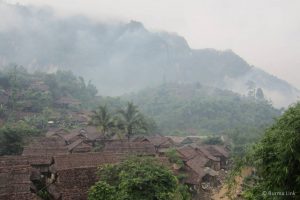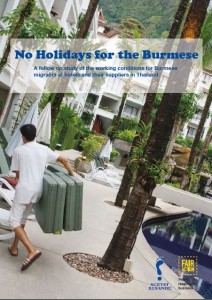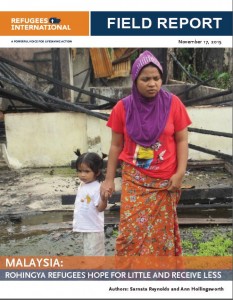Posts Tagged ‘Thailand’ (115 found)
World Refugee Day Calls for Greater Awareness of Burma’s Refugees
 20 June, 2016 marked World Refugee Day, a global recognition of the nearly 65 million people who are displaced worldwide. In Burma, the Day served as a tragic reminder of the displacement resulting from decades of civil war, state-sponsored persecution and forced relocation. According to a report released by the United Nations High Commissioner for Refugees (UNHCR), Burma is the second highest contributor of both refugees and internally displaced people (IDPs) in the Asia-Pacific region. By the end of 2015, there were 450,000 IDPs and 451,800 refugees, including the over 100,000 refugees that have been displaced in nine camps along the Thailand-Burma border.
20 June, 2016 marked World Refugee Day, a global recognition of the nearly 65 million people who are displaced worldwide. In Burma, the Day served as a tragic reminder of the displacement resulting from decades of civil war, state-sponsored persecution and forced relocation. According to a report released by the United Nations High Commissioner for Refugees (UNHCR), Burma is the second highest contributor of both refugees and internally displaced people (IDPs) in the Asia-Pacific region. By the end of 2015, there were 450,000 IDPs and 451,800 refugees, including the over 100,000 refugees that have been displaced in nine camps along the Thailand-Burma border.
No Holidays for the Burmese
 During the cold, dark and long winter, Swedes long for sunbathing and relaxation. Thailand is one of the most popular winter destinations for Swedish tourists, with a 26 percent increase in bookings for the 2015/2016 season. While the tourists enjoy all that Thailand tourism has to offer, such as the beautiful beaches, well-made beds and expansive pool areas, there is a flip-side to tourism paradise.
During the cold, dark and long winter, Swedes long for sunbathing and relaxation. Thailand is one of the most popular winter destinations for Swedish tourists, with a 26 percent increase in bookings for the 2015/2016 season. While the tourists enjoy all that Thailand tourism has to offer, such as the beautiful beaches, well-made beds and expansive pool areas, there is a flip-side to tourism paradise.
Southeast Asia: Governments Must Turn Commitments into Reality to Stem Southeast Asian Migrant and Refugee Crisis
Ahead of a regional meeting hosted by Thailand tomorrow, Amnesty International calls on the governments of Bangladesh, Indonesia, Malaysia, Myanmar and Thailand to prioritise protection of the human rights of migrants and refugees in any action directed at combating human trafficking and managing irregular migration. The government of Thailand is hosting the 2nd Special Meeting on Irregular Migration in the Indian Ocean on 4 December 2015 in Bangkok […]
• • •Malaysia: Rohingya Refugees Hope for Little and Receive Less
 It’s been six months since as many as 1,000 Rohingya fleeing from Myanmar died in the Andaman Sea. And still, neighboring nations remain resistant to recognizing the Rohingya people’s rights as refugees. Even after neighboring governments met earlier this year and agreed to protect the Rohingya at sea, no nation has taken a leadership role in permitting them to disembark from boats safely and legally. The absence of a regional plan leaves the Rohingya vulnerable to the challenges of a perilous sea voyage, and further strands those Rohingya who have lived in Malaysia and other regional nations for up to three generations without legal rights or protection. Without a doubt, Myanmar is creating this crisis […]
It’s been six months since as many as 1,000 Rohingya fleeing from Myanmar died in the Andaman Sea. And still, neighboring nations remain resistant to recognizing the Rohingya people’s rights as refugees. Even after neighboring governments met earlier this year and agreed to protect the Rohingya at sea, no nation has taken a leadership role in permitting them to disembark from boats safely and legally. The absence of a regional plan leaves the Rohingya vulnerable to the challenges of a perilous sea voyage, and further strands those Rohingya who have lived in Malaysia and other regional nations for up to three generations without legal rights or protection. Without a doubt, Myanmar is creating this crisis […]
တုိင္းရင္းသားလက္နက္ကိုင္ေတာ္လွန္ေရးအဖဲ႔ြအစည္းမ်ား၏ ထိပ္သီးအစည္းအေ၀းက်င္းပျခင္း သတင္းထုတ္ျပန္ခ်က္
• • •
Shans Present 23,717 Signatures against Salween Dams to Australian Consultants in Yangon
Shan community representatives are today presenting 23,717 signatures opposing the building of dams on the Salween River to the Australian company Snowy Mountains Engineering Corporation (SMEC) at their office in Yangon […]
• • •US: Don’t Let Trade Trump Human Rights
(Bangkok, July 28, 2015)—The U.S. State Department’s annual Trafficking in Persons (TIP) report fails to accurately assess Malaysia and Myanmar’s efforts to combat human trafficking, Fortify Rights said today. U.S. Secretary of State John Kerry released the report in Washington, D.C. on Monday, upgrading Malaysia from Tier-3 to Tier-2 Watch-List status and keeping Myanmar at Tier-2 Watch-List status, despite evidence that each country failed to adequately combat human trafficking in 2014 […]
• • •Garment Workers – Demand Award Wages, Lunch Breaks and Reasonable Overtime Hours
About 700 migrant workers from the Garman (aka A1) garment factory in Mae Sot, Thailand staged a protest over seven demands […]
• • •Save the Salween River
The Salween/Thanlwin River is the second longest river in Southeast Asia, invaluable for the survival of the ethnic people who live along it. It not only has great historical significance but is also avital lifeline nourishing a wide range of biodiversity […]
• • •Stateless At Sea: The Moken of Burma and Thailand
 The 25-page report, “Stateless at Sea: The Moken of Burma and Thailand,” describes in words and photographs serious violations of the rights of the Moken by state authorities – particularly the Burmese navy – including extortion, bribery, arbitrary arrest, and confiscation of property. Human Rights Watch also examines tightening immigration and maritime conservation laws that threaten their freedom of movement and traditional lifestyle. Most Moken are stateless, making them extremely vulnerable to human rights abuse and depriving them of access to medical care, education, and employment opportunities.
The 25-page report, “Stateless at Sea: The Moken of Burma and Thailand,” describes in words and photographs serious violations of the rights of the Moken by state authorities – particularly the Burmese navy – including extortion, bribery, arbitrary arrest, and confiscation of property. Human Rights Watch also examines tightening immigration and maritime conservation laws that threaten their freedom of movement and traditional lifestyle. Most Moken are stateless, making them extremely vulnerable to human rights abuse and depriving them of access to medical care, education, and employment opportunities.









 All posts
All posts